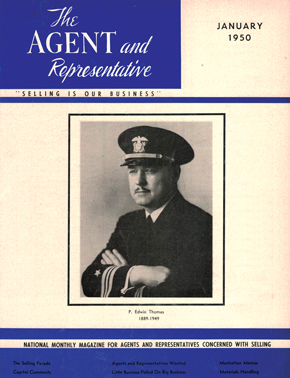Reviving Salesmanship

By P. Edwin Thomas, Executive Secretary
Reprinted from December 1949 The AGENT and Representative magazine
Decadence in the art of salesmanship was blamed recently by a prominent banker for business apathy. True salesmanship, it was claimed, consists chiefly in service to the consumer, not in persuasive argument or persistent solicitation. It calls for study and skill in human relations, not taking advantage of unwise impulses and a reckless itch to spend.
This banker concluded by suggesting that intelligent advertising, common courtesy, knowledge of the product and cultivation of long-range “repeat trade” will work wonders with many a faltering business nowadays.
With much of which we agree. However, persuasive argument, persistent solicitation — that’s mighty important to successful salesmanship!
It’s something like the game of basketball — one man passes the ball to another. With skill, the play culminates in a score.
The manufacturer passes the ball to the agent, the agent to the wholesaler, the wholesaler to the retailer, the retailer to the consumer. Score: A goal! Who shall say whether or not the consumer can afford it? If he doesn’t know, who does?
Importance of Manufacturers’ Agents
The Wholesale Furniture Salesman for September 15th has this to say:
“The independently established professional wholesale salesman, who is faced with the manufacturer’s decision to employ its own exclusive (private) salesmen, feels that this is socialization of service. Being a believer in the American concept of free enterprise, he frowns upon such isolated decisions just as the manufacturer would frown upon regimentation directed at him by an outside source.
“To be required to put all of his eggs in one basket has proven disastrous to many salesmen who have gone along with the exclusive policy.
“A factory fails, there is a fire, a temporary closing for refinancing, or other things can happen. Disagreements are also fatal to the exclusive salesman. When his line gets cold for one reason or another, where is he?
“Further, most salesmen do not have a broad, comprehensive, all-inclusive contract.”
The salesmen involved here are, we believe, for the most part, commission salesmen working for one principal only, as opposed to commission agents with two or more accounts.
We do not quite know what is meant by “socialization of service,” and do not seem able to evaluate the claim of implied unfairness. The fundamental concept of American free enterprise would seem to permit the manufacturer to choose his sales policy and establish his sales organization in accordance with what appears to him good sense and good management, whether that be private salesmen, commission salesmen, or agents.
With these, he should deal fairly, just as any of these should treat him — with consideration and justice.
The crux of the relationship, it would seem, is the adequacy of the contract. We have been stressing consideration of the MANA Standard Form of Agreement, in the case of independent agents, because we believe that a comprehensive agreement is necessary and vital to agent and principal alike.
Manufacturers’ Agents Have Lost a Champion
By Edgar A. Wilcox, MANA President
 Reprinted from January 1950 The AGENT and Representative magazine
Reprinted from January 1950 The AGENT and Representative magazine
Sensing they represented the single yet unorganized branch of industry. P. Edwin Thomas tackled the job of bringing order out of chaos. At his own expense and in sheer love of the cause he threw his tremendous energies and wide experience into the effort. His accomplishments speak for themselves and are many, more than generally realized.
MANA, which he founded, is a rapidly expanding group through which its members and others have already secured benefits impossible of attainment by individual efforts. He, through MANA, secured modification of a bureaucratic ruling that would have denied payment of commissions to established agents selling the war department. He developed a comprehensive, long needed form of agency contract that affords just and legal protection for the agent as well as principal. He brought out a uniform code of ethics suggesting the moral relationships that should prevail between principal and agent, between agent and customer and between agents themselves.
Heretofore each had his own code, often quite selfish and frequently breeding needless dissension. First through MANA bulletins and later through his magazine, articles of interest and material benefit were published, a sounding board created and means for bringing principal and agents together provided. The magazine has been proving as helpful to principals who deal through agents as to agents themselves. Much work had been done in preparation of a classified agents’ directory that will be of great benefit to many. The ground work has been laid for a helpful and powerful organization.
Behind all this is the ultimate yet little recognized effort of P. Edwin Thomas, who gave his all to make it the success it deserves and has much promise of attaining.
A. X. Schilling has been selected as his successor to the position of executive secretary of MANA and is carrying on the fine work started by P. Edwin Thomas. Your officers urge you to continue your generous cooperation to the end that this association may grow to the powerful stature planned for it.

